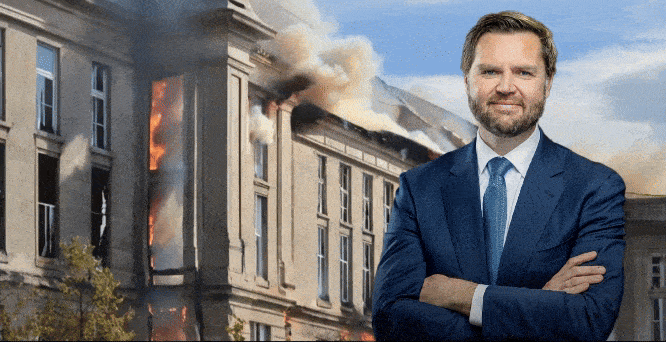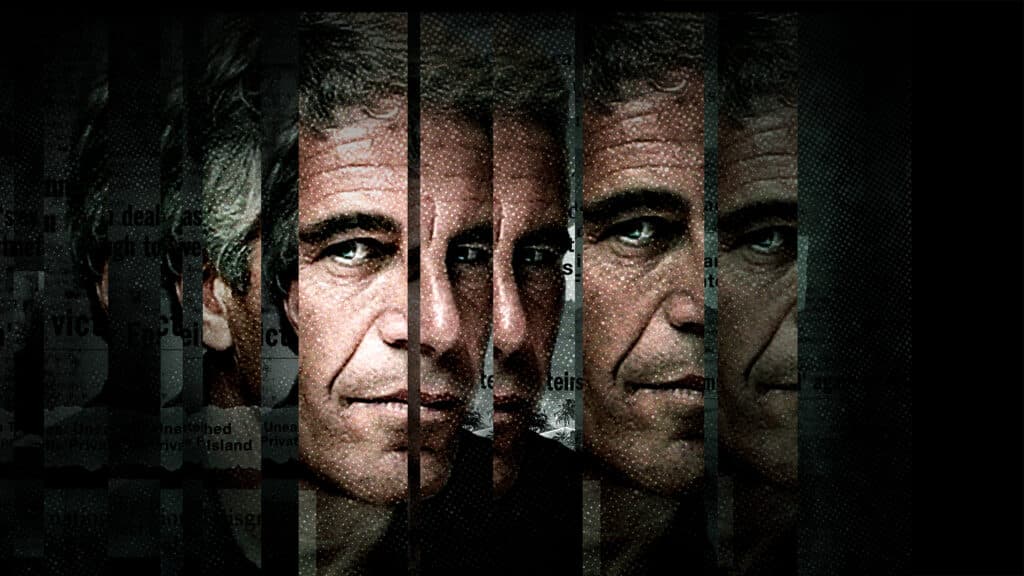
All Eyes on Vance as Turmoil Over Gutting USAID Grows
Amid a raging, mainly partisan battle over President Trump’s plans to slash foreign aid, Vice President J.D. Vance is set to address a summit of religious leaders and advocates looking to him for reassurance that the administration won’t abandon the lessons learned since the Holocaust.
Vance is set to speak Tuesday morning to the International Religious Freedom Summit, a bipartisan gathering of U.S. religious and coalition leaders, nonprofits, and human-rights activists supporting the right of all individuals worldwide to worship in the faith of their choice or not to worship at all.
The vice president will take the stage at the gathering in Washington, D.C., as the jittery group of religious and nonprofit leaders brace for a massive restructuring and deep staffing and budget cuts for U.S.-funded humanitarian assistance. The remarks have taken on heightened significance after Trump froze foreign assistance for 90 days, a move he argued was necessary to eliminate waste, abuse, and what he, Elon Musk, and many Republicans have derided as “woke” and “insane” programs at the U.S. Agency for International Development, which is devoted to administrating foreign aid.
Some of the most flagrant examples of USAID waste, Trump, Musk, and others have cited include: $1.5 million to advance DEI in Serbian workplaces, $70,000 for the production of a DEI musical in Ireland, $47,000 for a trans opera in Colombia, and $32,000 for a trans comic book in Peru. The agency also sent millions to EcoHealth Alliance, which was involved in research at the Chinese state-controlled Wuhan lab that the CIA now says is likely responsible for the release of COVID-19.
USAID’s budget nearly doubled from the beginning of Trump’s first term in 2017 to the end of President Joe Biden’s term, rising from $20.5 billion in 2017 to $42.4 billion in 2023. The increase was largely to account for aid to Ukraine after Russia’s invasion, though for decades, global healthcare was its largest expenditure. The healthcare budget dramatically increased in 2004 with a new program aimed at curbing AIDS, and again after 2020, with emergency assistance to combat the COVID-19 pandemic.
Many of those stocks of medicine are deteriorating without refrigeration in another massive waste of taxpayer funds.
Secretary of State Marco Rubio on Monday announced that he will serve as acting USAID administrator, a move he said would precede the State Department’s takeover of the humanitarian agency and efforts to align its operations with Trump’s “America First” agenda and the national interest. Agency officials, he argued, were uncooperative and insubordinate, refusing to comply with the policy agenda of the new Trump administration.
In a letter to lawmakers Monday, Rubio said he had delegated authority to Pete Marocco, a Trump appointee who is heading the State Department’s Office of Foreign Assistance. Marocco served as a USAID political appointee in the president’s first term but was pushed out by other agency officials over his abrasive approach, according to several sources.
Congressional Democrats, who have spent the last several days protesting outside USAID’s offices in D.C., accuse Trump and Musk, who heads the Department of Government Efficiency, of unlawfully shuttering the agency. This week Sen. Chris Van Hollen, a Maryland Democrat, and several other colleagues staged protests outside USAID’s offices that were reportedly taken over by DOGE officials.
Republicans and conservative nonprofits and advocates for some humanitarian assistance, including some evangelical Christian leaders and nonprofits usually aligned with GOP leaders, are deeply divided. While there is near-unanimous agreement on cutting wasteful spending, bitter disagreements remain on whether USAID should be folded into the State Department, allowed to remain its own agency with a narrowed mission and smaller budget, or eliminated entirely.
Many of the faithful who gathered at the International Religious Freedom Summit where Vance is set to speak on Tuesday expressed hope that Trump and the new Congress would provide more support for the religious freedom cause than the Biden administration had done. Others viewed the clash over the future of USAID as an inflection point.
Advocates of faith-based liberty argue that eliminating many U.S. humanitarian programs that help foster religious pluralism will only lead to more extremism, persecution, and instability in the world.
Sam Brownback, former governor of Kansas who served as the ambassador-at-large for International Religious Freedom during the first Trump term, in opening statements argued that religious freedom is the “God-designed human right of the soul that must be protected, guaranteed by all governments and honored for there to be authentic human flourishing of the whole person.”
“Imagine a world, then, where there is religious freedom for everyone, everywhere – no more genocides, because most genocides happen to religious minorities,” said Brownback, who serves as the gathering’s co-chair. “Fewer clashes of civilizations because most of these clashes are rooted in religious differences being exploited, not protected.”
In freezing foreign aid, Rubio said any future expenditures would need to meet Trump’s “America First” priorities of helping to increase America’s security and prosperity.
Panelist Scott Flipse, director of policy and media relations of the Congressional-Executive Commission on China, pointed to U.S. foreign assistance grants aimed at countering extremism and religious violence.
“I think the president not only wants to end conflicts, I think he also wants to be a peacemaker,” he said. “…I don’t want to be Pollyanna-ish, but there is a role here for religious groups, religious organizations and people to build peace.”
When the panelists were asked to offer advice to Rubio, Flipse argued that “personnel is policy” and encouraged the secretary of state to “get people into positions in the bureaus as quickly as possible to carry out whatever reevaluations are going on but also to carry out some of the priorities that we all know he has, and he spoke about at his confirmation.”
Annie Boyajian, co-president of the human-rights group Freedom House, stressed that it was a pivotal time, that religious freedom advocates face a “tremendous challenge, but also tremendous opportunity.” A recent study, she said, shows that the number of countries where faith-based liberty doesn’t exist or is severely restricted has grown from 27 to 40.
Countries that provide such freedoms are the most stable and are usually the best partners for trade and economic prosperity, she said.
“And so, it’s an incredible opportunity to reassess policies that can be used to move religious freedom forward,” Boyajian said. “And I think in this exact moment one of the most immediate things that we can do is make sure that the funding freeze that is in place is lifted for that support of religious freedom.”
While new presidents have the right to reassess how taxpayer funds are spent, Trump may have accidentally caught religious freedom programs in the DOGE dragnet. Many programs benefiting religious freedom and people of all faiths have been temporarily frozen under the Trump administration, she said, even though Trump, during his first administration with Brownback, did a “tremendous job of protecting, defending and raising these rights.”
“We certainly think there’s a great opportunity to continue to do that,” she added.
Freedom House has long worked with Rubio, whom Boyajian described as a “man of faith” and a champion of the cause.
“I would just urge him, as he undertakes his review, not to throw the baby out with the bath water,” she said. “There is so much excellent work on religious freedom being done – very, very critically important that it makes it through an expeditious review because lives really are on the line.”
Longtime champions of the cause said they initially welcomed Trump’s second term as an opportunity to return to a commitment to religious freedom that the Biden administration had treated as only one of many human rights concerns instead of a top priority. The freeze on foreign assistance, however, is creating new uncertainly, they warned.
Katrina Lantos Swett, who chairs the bipartisan International Religious Freedom Summit, is the daughter of the late Rep. Tom Lantos, a California Democrat, the only Holocaust survivor to serve in Congress, and an ardent human rights champion.
“The international religious freedom community is looking with great hope and anticipation to this new administration because we feel like there’s some really strong allies,” she told RCP. “They’re viscerally strong. People really feel it and believe it. But it’s that old line, ‘Put your money where your mouth is.’”
While she agrees with the efforts to ferret out the “excessive” waste, fraud, and abuse, she too worries that the new administration can jettison the good with the bad.
Lantos Swett said she has heard from numerous “incredibly earnest and brave human-rights advocates” in the vulnerable Uyghur Muslim communities in China and Yazidis in Iraq decimated by ISIS that their very modest U.S. funding has been cut off.
“The international religious freedom movement is an issue that is intimately tied to a holistic approach to our national security,” she noted. “We know that societies that breed extremists and social division tend to become problems for us. They tend to export terror and radicalism and there are also a lot of fleeing people who then become refugees and want to come to our country.”
Just hours before Vance was set to speak, however, the Trump administration sent new shockwaves through human rights communities.
RealClearPolitics last week first reported efforts to place more than 50 USAID officials on leave. Since then, Rubio has ordered or signed off on several more efforts to force the agency to cease and desist all of its overseas programs and activity.
The Trump administration Tuesday night announced that nearly all USAID staff will be placed on leave Friday. Earlier in the day, the agency ordered all overseas USAID programs to be shut down and recalled all staff at missions around the world, with certain “case-by-case exceptions” for return-travel extensions for “personal or family hardship, mobility, or safety concerns.”
Forcing decades-long foreign service officers – many of whom bring their families overseas with them – out of their jobs on a few days’ notice, while halting the distribution of food, medicine, and vaccines, risks the trust and relationships with foreign partners. It also jeopardizes programs to advance religious liberty forged during the first Trump term, which were only successful because several officials fought the career officials over several years to make them happen, advocates warn.
Those objecting to DOGE’s harsh tactics argue that the values so many believers hold dear are being brushed aside for expedient budget cutting.
While many of Trump’s strongest “America First” supporters want to slash the foreign assistance budget, Boyajian argues that some may support exceptions for persecuted Christians and other religious minorities overseas if given the chance to understand the impact.
“For me, personally, as a Christian, as believers, it’s so important that we’re advocating for religious freedom. But also, every single human being is precious and made in the image of God,” she added. “In my personal view, it is incumbent on us to also help protect others who are targeted and bring them along.”
This article was originally published by RealClearPolitics and made available via RealClearWire.



